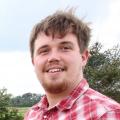A HEXHAM man who took part in daring bombing raids over Germany in the Second World War World has died at the age 95.
Hugh Reay, who was one of the last remaining men to serve as part of the RAF’s Bomber Command, died on May 3 following a short illness.
Hugh was born in West Woodburn in 1925, and joined the RAF in 1943, training at RAF Lossiemouth in Scotland on Wellington bombers.
After training, he was posted to RAF Melbourne in Yorkshire.
Hugh was a wireless operator aboard the four-engined Handley Page Halifax bombers with 10 Squadron – part of No. 4 Group Bomber Command.
Wireless operators were responsible for transmitting all messages to and from the aircraft to its base. They also served as the reserve gunner, addressing minor emergencies in any part of the aircraft.
If the plane was forced to ditch into the sea, the wireless operator had to remain at his post to send out a distress signal.
Bomber Command crews suffered an extremely high casualty rate – 55,574 were killed out of 125,000 aircrew, a death rate of 44.4 per cent.
From September 1939, 10 Squadron alone lost a total of 47 Whitley and 109 Halifax aircraft in its bombing operations over Europe, resulting in 835 aircrew losing their lives.
As a member of the squadron, Hugh bravely took part in daring raids over Germany’s industrial heartland, the Ruhr Valley, attacking coke plants, steelworks and oil plants vital to the Nazi war effort.
Later, the squadron targeted U-boat pens, shipyards and oil refineries in Hamburg and the economic hub of Nuremberg.
On April 25, 1945, 10 Squadron took part in a major raid on the East Frisian island of Wangerooge, targeting German gun positions. It was the squadron’s last operational mission of the war and one of the last major Allied air attacks on German territory in the war.
After VE Day the squadron was immediately transferred to Transport Command and preparations were made to train its aircrew on the Dakota aircraft (Douglas C-47) in preparation for deployment overseas to India.
Hugh was involved in training Indian paratroopers and took part famine relief air drops in Burma during March 1945.
He left India in 1947, shortly before the country gained independence, and returned to Tynedale.
After the war he worked as company secretary for Matthew Charlton’s Builders Merchants in Hexham, where he remained until his retirement in 1995.
During his working career he was also a leading member of the Royal Observer Corps. Before leaving the service, he received a Lord Lieutenant’s Good Service Certificate from the Duke of Northumberland.
His son, Trevor, said: “Hugh was the most loving, kind, gentle and generous husband, father, grandfather and great grandfather that his family could have ever wished for.
“He never let anyone down and fulfilled every obligation he ever undertook.
“Everyone who met him and was associated with him had the highest regard for his personality, generosity and good humour. His dignity in life was matched by his dignity at the end of it.”
Hugh leaves behind his wife of over 69 years, Doreen, as well as three children, seven grandchildren and three great-grandchildren.
He was laid to rest on Wednesday at a small family graveside service at the West Road Cemetery in Hexham.






Comments: Our rules
We want our comments to be a lively and valuable part of our community - a place where readers can debate and engage with the most important local issues. The ability to comment on our stories is a privilege, not a right, however, and that privilege may be withdrawn if it is abused or misused.
Please report any comments that break our rules.
Read the rules here